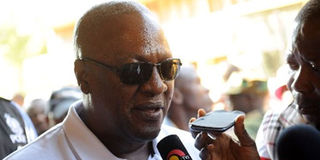Ghana's Mahama in slim lead with most votes counted

Ghana's President John Dramani Mahama talks to the press after casting his vote at the Bole polling station in Bole Bamboi Constituency, northern Ghana, on December 7, 2012. Photo/AFP
What you need to know:
- Mahama, 54, of the National Democratic Congress, only took power in July, when his predecessor John Atta Mills died following an illness.
Ghana President John Dramani Mahama held a slim lead over presidential election rival Nana Akufo-Addo on Sunday with nearly all votes counted, local media said, adding he was the likely winner. Read (Early results show tight race as Ghana votes for second day)
The stakes are especially high in a nation with a booming economy fuelled by a new and expanding oil industry.
Ghana is also seeking to further burnish its credentials as a stable democracy in turbulent West Africa.
Privately owned Joy News television, based on provisional results from 261 of 275 districts, said Mahama had 50.03 percent and Akufo-Addo 48.05 percent.
The station added that "Mahama is the likely president-elect of Ghana" but the electoral commission had not made any declaration.
It based its finding on trends of already tallied votes in addition to an analysis of outstanding districts, it said. It also reported that turnout was at 81 percent.
There were a total of eight presidential candidates. A run-off vote will be held on December 28 if no candidate receives more than 50 percent.
Mahama, 54, of the National Democratic Congress, only took power in July, when his predecessor John Atta Mills died following an illness.
The 68-year-old Akufo-Addo of the New Patriotic Party, the son of a former president, lost by less than one percentage point in 2008.
Ghana's presidential and parliamentary polls were held on Friday, but polling stations in some areas re-opened on Saturday after problems with a new biometric system and late delivery of materials led to delays.
Elections since the return to civilian rule in 1992 have seen both parties voted out of office, establishing Ghana's democratic credentials in a region that has seen its share of rigged polls and coups.
Ghana is also a top exporter of cocoa and gold, with economic growth of 14 percent in 2011. Eight percent growth is expected for 2012 and 2013.
How to spend Ghana's newfound oil money has been a key issue. Mahama has advocated a large investment in infrastructure, while Akufo-Addo has promoted his signature policy of free secondary education.
Observers from the Economic Community of West African States (ECOWAS), a 15-nation regional body, said Saturday that "in the main, the electoral process was peaceful and transparent."
On the first day of the election on Friday, voting went smoothly in many areas, but a new biometric system requiring electronic fingerprints broke down in certain districts, resulting in long lines and frustration.
Materials arriving late also caused some polling stations to open far behind schedule.
In areas affected by the two issues, election officials ordered polling stations to extend voting into a second day.
Saturday was largely calm, but in the afternoon authorities fired tear gas to disperse a crowd of more than 100 people who burnt rubbish in the streets of a neighbourhood in the capital Accra.
The protesters were angry over rumours of vote-rigging. No evidence of rigging has emerged.
Ghana has had five elections since military rule ended in 1992, but the stakes are seen as higher this time, as commercial oil production that began in 2010 is set to expand.




